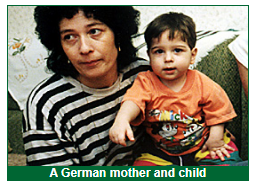Equally noticeable is the falling birth rate in Germany with more and more couples choosing not to have children. For about 25 years the birth rate has been one third below the level necessary to replenish the population. In 1950 the average number of persons in German households was 3.0. By 1990 this figure had declined to 2.3. In the early 1990s, only foreign families were regularly having two or more children, with the Turkish subgroup being the largest in terms of family size. The slump in the birth-rate has been particularly pronounced after reunification in the east of Germany wher a combination of high female unemployment and the dismantling of the GDR's child-care system has dissuaded women from starting a family.

The Federal Government has become increasingly aware of the need to promote family life and as of 1 January 2001 new legislation governing child-raising benefit came into force, entitling both parents to apply for child-raising leave simultaneously and spend up to 30 hours a week in part-time work. The aim was to redress the traditional role division between the sexes wherby mothers typically stayed at home to look after their children, which had an adverse effect on their professional lives.
 英语
英语 日语
日语 韩语
韩语 法语
法语 西班牙语
西班牙语 意大利语
意大利语 阿拉伯语
阿拉伯语 葡萄牙语
葡萄牙语 越南语
越南语 俄语
俄语 芬兰语
芬兰语 泰语
泰语 丹麦语
丹麦语 对外汉语
对外汉语

